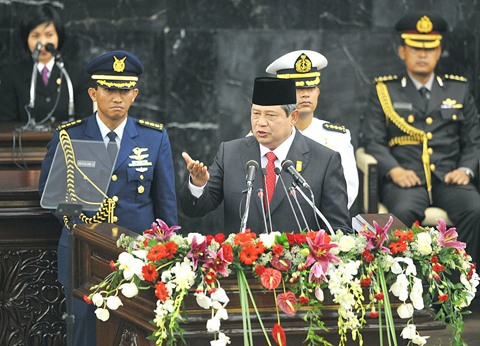Liberal former general Susilo Bambang Yudhoyono was sworn in as Indonesia’s president yesterday after winning a second five-year term with promises of economic growth and political reform.
The softly spoken leader swore on the Koran to uphold the Constitution during a ceremony in the national assembly in Jakarta which was broadcast around the archipelago of 234 million people.
“By Allah I swear I will adhere to the Constitution as faithfully as possible, and will commit myself to the country and the people,” Yudhoyono said.

PHOTO: AFP
A massive security blanket descended on the center of the capital, with about 20,000 police backed by armored vehicles on hand to secure the inauguration.
The event was attended by the leaders of Australia, Brunei, East Timor, Malaysia and Singapore, as well as senior officials from around the world.
Yudhoyono, 60, trounced former president Megawati Sukarnoputri in 2004 to become the mainly Muslim country’s first directly elected head of state since the fall of late military strongman Suharto in 1998.
He did it again in July, easily defeating Democratic Party of Struggle chief Megawati as well as his vice president, the Golkar Party’s Jusuf Kalla, to become the first Indonesian leader to be democratically re-elected.
Cementing his place as the figurehead of the post-Suharto reform era, Yudhoyono’s centrist Democratic Party won the most seats in parliament in April general elections just eight years after it was founded.
He has promised to crack down on corruption, boost infrastructure spending and advance bureaucratic reform.
As the world’s third-largest democracy, Indonesia is also seeking to play a greater role in multilateral forums such as the G20 and global talks on a new climate pact.
The doctor of agricultural studies — who likes to pen romantic ballads in his spare time — has also pledged to steer Southeast Asia’s biggest economy through the global downturn.
“The essence of our program for the next five years is to improve welfare, strengthen democracy and the legal system,” Yudhoyono said. “In the middle of the economic crisis, Indonesia can still grow positively. But we cannot stay idle, as our tasks are far from over.”
“Just like a ship moving forward, we will head through an ocean full of waves and storms,” he said, referring to volatile crude oil prices and stagnant investment.
The government has predicted economic growth of 4 percent to 4.5 percent this year, third only to China and India in the G20 club of rich and major developing countries. The economy grew 6.1 percent last year.

POLITICAL PRISONERS VS DEPORTEES: Venezuela’s prosecutor’s office slammed the call by El Salvador’s leader, accusing him of crimes against humanity Salvadoran President Nayib Bukele on Sunday proposed carrying out a prisoner swap with Venezuela, suggesting he would exchange Venezuelan deportees from the US his government has kept imprisoned for what he called “political prisoners” in Venezuela. In a post on X, directed at Venezuelan President Nicolas Maduro, Bukele listed off a number of family members of high-level opposition figures in Venezuela, journalists and activists detained during the South American government’s electoral crackdown last year. “The only reason they are imprisoned is for having opposed you and your electoral fraud,” he wrote to Maduro. “However, I want to propose a humanitarian agreement that

ECONOMIC WORRIES: The ruling PAP faces voters amid concerns that the city-state faces the possibility of a recession and job losses amid Washington’s tariffs Singapore yesterday finalized contestants for its general election on Saturday next week, with the ruling People’s Action Party (PAP) fielding 32 new candidates in the biggest refresh of the party that has ruled the city-state since independence in 1965. The move follows a pledge by Singaporean Prime Minister Lawrence Wong (黃循財), who took office last year and assumed the PAP leadership, to “bring in new blood, new ideas and new energy” to steer the country of 6 million people. His latest shake-up beats that of predecessors Lee Hsien Loong (李顯龍) and Goh Chok Tong (吳作棟), who replaced 24 and 11 politicians respectively

Young women standing idly around a park in Tokyo’s west suggest that a giant statue of Godzilla is not the only attraction for a record number of foreign tourists. Their faces lit by the cold glow of their phones, the women lining Okubo Park are evidence that sex tourism has developed as a dark flipside to the bustling Kabukicho nightlife district. Increasing numbers of foreign men are flocking to the area after seeing videos on social media. One of the women said that the area near Kabukicho, where Godzilla rumbles and belches smoke atop a cinema, has become a “real

‘WATER WARFARE’: A Pakistani official called India’s suspension of a 65-year-old treaty on the sharing of waters from the Indus River ‘a cowardly, illegal move’ Pakistan yesterday canceled visas for Indian nationals, closed its airspace for all Indian-owned or operated airlines, and suspended all trade with India, including to and from any third country. The retaliatory measures follow India’s decision to suspend visas for Pakistani nationals in the aftermath of a deadly attack by shooters in Kashmir that killed 26 people, mostly tourists. The rare attack on civilians shocked and outraged India and prompted calls for action against their country’s archenemy, Pakistan. New Delhi did not publicly produce evidence connecting the attack to its neighbor, but said it had “cross-border” links to Pakistan. Pakistan denied any connection to